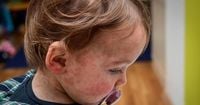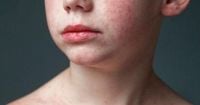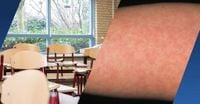As of Wednesday, March 26, 2025, a concerning outbreak of measles has been reported at a primary school in Amsterdam Nieuw-West, with twenty children now confirmed infected. This announcement came from Alexander Scholtes, the city’s health alderman, during a municipal council meeting. While the number of cases has risen from sixteen just last week, Scholtes noted that the measles cluster at the school does not appear to be growing exponentially.
Measles, a highly contagious viral disease, can lead to serious complications. According to health experts, between 1 to 5 percent of measles cases can develop into pneumonia, and approximately one in a thousand cases may result in meningitis, which can be fatal. Despite the severity of these potential outcomes, the current situation has been somewhat contained, with all infections in Amsterdam traceable directly to the school or the family situations of the infected children.
Scholtes emphasized the importance of vaccination in combating such outbreaks. He stated, "It is still too early to say that the outbreak is under control, as new infections could occur elsewhere in the city." His remarks reflect growing concerns about the rising number of measles cases across the Netherlands, where the RIVM (National Institute for Public Health and the Environment) reported a significant increase in infections last week, totaling 108 cases. This figure already surpasses half of the total 202 cases reported throughout the entire previous year.
In response to the outbreak, the GGD (Municipal Health Service) has completed source and contact tracing and is closely monitoring the situation. To facilitate vaccination efforts, extra low-threshold vaccination sites have been established in the district, allowing parents to have their children vaccinated without an appointment. Scholtes reiterated his call to parents, urging them to vaccinate their children as a measure to prevent further outbreaks of diseases like measles.
Notably, none of the infected children in the Amsterdam cluster had been vaccinated against measles. Among the twenty infected, four have required hospitalization, highlighting the seriousness of the situation. Vaccination schedules recommend that children receive their first measles vaccination at 14 months, followed by a booster shot around three years of age.
Moreover, the outbreak is not isolated to Amsterdam; it is part of a broader trend. Reports indicate that seventeen individuals who contracted measles in 2025 had traveled to Morocco, where significant epidemics are currently occurring. Additionally, three cases have been linked to Romania, further underscoring the international dimensions of this public health issue.
The rising number of measles cases has been attributed to a decline in vaccination rates, a trend that health officials are keen to reverse. The RIVM has emphasized the necessity of adhering to the national vaccination program to protect children and communities from preventable diseases.
As the situation evolves, health authorities continue to stress the importance of vaccination for both children and adults, especially those traveling to areas where measles is prevalent. The current outbreak serves as a stark reminder of the vulnerability of communities to vaccine-preventable diseases when immunization rates fall.
In light of these developments, parents are encouraged to stay informed and proactive regarding their children's health. Vaccination not only protects individual children but also contributes to the broader public health goal of herd immunity, which helps protect those who cannot be vaccinated for medical reasons.
In conclusion, the measles outbreak in Amsterdam highlights the critical need for continued public health education and vaccination efforts. As health officials work to contain this outbreak, the community's response will be vital in preventing further infections and ensuring the health and safety of children across the region.







